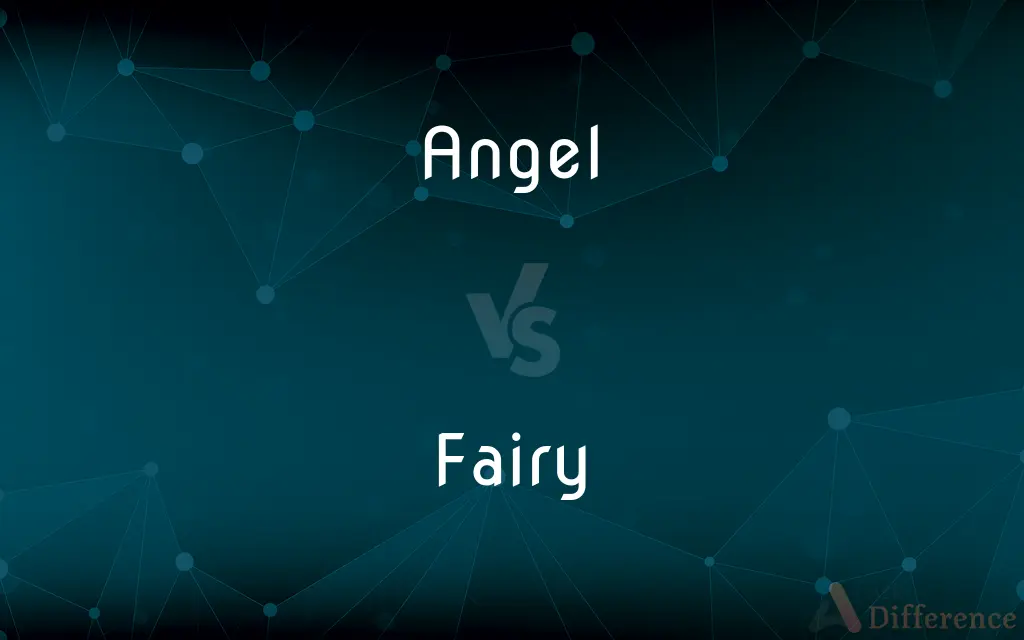Angel vs. Fairy — What's the Difference?
By Fiza Rafique & Maham Liaqat — Updated on March 8, 2024
An angel is a spiritual being believed to act as a messenger of God, typically depicted with wings; while a fairy is a mythical, magical creature, often portrayed as human-like and connected to nature.

Difference Between Angel and Fairy
Table of Contents
ADVERTISEMENT
Key Differences
Angels are often depicted as messengers or servants of a monotheistic deity, embodying purity, divine wisdom, and protection. They are featured prominently in religions such as Christianity, Islam, and Judaism, where they carry out God's will and communicate divine messages to humans. In contrast, fairies are mythical beings stemming from European folklore, embodying magic, nature, and a capricious temperament. Unlike angels, whose roles and appearances are more standardized across various texts, fairies are diverse in their portrayal, with their characteristics varying significantly across cultures and stories.
While angels are typically visualized with human-like forms, majestic wings, and sometimes halos, symbolizing their divine origin and heavenly associations, fairies are often imagined as diminutive, enchanting creatures with wings resembling those of butterflies or dragonflies, highlighting their connection to the natural world. This distinction in appearance underscores the heavenly versus earthly realms they are believed to inhabit.
The concept of angels is rooted in religious traditions, serving as a bridge between the divine and the human, guiding and protecting people according to divine will. Fairies, however, originate from folk traditions and are frequently connected with ancient nature spirits, embodying the unpredictable forces of nature and often interacting with humans in mischievous or benevolent ways, independent of a divine mandate.
Angels are generally seen as benevolent beings working for the good of humanity under the direction of a higher power, offering guidance, comfort, and protection. On the other hand, fairies can be unpredictable, ranging from helpful and kind to mischievous or even malevolent, reflecting the dual aspects of nature as nurturing and perilous.
In literature and art, angels are often invoked to convey themes of redemption, divine intervention, and spiritual awakening, their presence signifying a higher moral or ethical calling. Fairies, meanwhile, are utilized to explore themes of enchantment, the supernatural, and the complex interactions between the human and fairy realms, inviting a reflection on the mysteries of the natural world and the human psyche.
ADVERTISEMENT
Comparison Chart
Origin
Religious texts and traditions
Folklore and mythology
Role
Messengers and servants of God, protectors
Nature spirits, magical beings
Appearance
Human-like with wings and halo, symbolizing divinity
Small, enchanting, with nature-inspired wings
Nature
Benevolent, guiding according to divine will
Ranges from benevolent to mischievous or malevolent
Symbolism
Divine intervention, moral guidance
Magic, the natural world, the unknown
Cultural Significance
Found in monotheistic religions
Rooted in European folk traditions
Interaction with Humans
Direct, with a clear divine purpose
Indirect, capricious, based on nature's whims
Depiction in Media
Majestic, awe-inspiring
Whimsical, enchanting
Ethical Alignment
Generally good, aligned with divine will
Neutral, aligned with natural forces
Compare with Definitions
Angel
A celestial being serving as a divine messenger and protector.
The angel Gabriel appeared to Mary to deliver the message of Jesus' birth.
Fairy
A mythical being with magical powers, often connected to nature.
She read a tale about a fairy who could control the weather.
Angel
Associated with specific religious texts and beliefs.
Angels play significant roles in the Bible, Torah, and Quran.
Fairy
Represents the mystical aspects of the natural world.
In ancient times, fairies were believed to guard the forest.
Angel
Symbol of purity and guidance in many cultures.
In her time of need, she prayed for an angel to guide her way.
Fairy
A common figure in folklore and children's stories.
Children's books are filled with stories of fairies and their adventures.
Angel
Considered a mediator between God and humanity.
Angels are seen as God's messengers, bringing his words to the faithful.
Fairy
Depicted as small and human-like with wings.
The fairy in the story had delicate wings like those of a butterfly.
Angel
Depicted with wings and a halo in art.
Renaissance paintings often feature angels with golden halos.
Fairy
Known for their mischievous and unpredictable behavior.
The farmer blamed the fairies for his missing livestock.
Angel
An angel is a supernatural being in various religions. The theological study of angels is known as angelology.
Fairy
A fairy (also fay, fae, fey, fair folk, or faerie) is a type of mythical being or legendary creature found in the folklore of multiple European cultures (including Celtic, Slavic, German, English, and French folklore), a form of spirit, often described as metaphysical, supernatural, or preternatural. Myths and stories about fairies do not have a single origin, but are rather a collection of folk beliefs from disparate sources.
Angel
A spiritual being believed to act as an attendant, agent, or messenger of God, conventionally represented in human form with wings and a long robe
The Angel of Death
God sent an angel to talk to Gideon
Fairy
A small imaginary being of human form that has magical powers, especially a female one
Fairy gold
She believed she had had fairies at the bottom of her garden
Angel
A person of exemplary conduct or virtue
Their parents think they are angels
I know I'm no angel
Fairy
A Central and South American hummingbird with a green back and long tail.
Angel
A person who supports a business financially, typically one who invests private capital in a small or newly established enterprise
The longer it takes you to get your product into the marketplace, the longer it will be until the angels get their money back
Fairy
An imaginary being in human form, depicted as clever, mischievous, and possessing magical powers.
Angel
An aircraft's altitude (often used with a numeral indicating thousands of feet)
We rendezvous at angels nine
Fairy
Offensive Slang Used as a disparaging term for a gay man.
Angel
An unexplained radar echo.
Fairy
The realm of faerie; enchantment, illusion.
Angel
A typically benevolent celestial being that acts as an intermediary between heaven and earth, especially in Christianity, Judaism, Islam, and Zoroastrianism.
Fairy
A mythical being with magical powers, known in many sizes and descriptions, although often depicted in modern illustrations only as a small sprite with gauze-like wings, and revered in some modern forms of paganism.
Angel
A representation of such a being, especially in Christianity, conventionally in the image of a human figure with a halo and wings.
Fairy
An enchantress, or creature of overpowering charm.
Angel
Angels(Christianity) The last of the nine orders of angels in medieval angelology. From the highest to the lowest in rank, the orders are
Seraphim, cherubim, thrones, dominations or dominions, virtues, powers, principalities, archangels, and angels.
Fairy
A member of two species of hummingbird in the genus Heliothryx.
Angel
A guardian spirit or guiding influence.
Fairy
A legendary Chinese immortal.
Angel
A kind and lovable person.
Fairy
Like a fairy; fanciful, whimsical, delicate.
Angel
One who manifests goodness, purity, and selflessness.
Fairy
Enchantment; illusion.
The God of her has made an end,And fro this worlde's fairyHath taken her into company.
Angel
A financial backer of an enterprise, especially a dramatic production or a political campaign.
Fairy
The country of the fays; land of illusions.
He [Arthur] is a king y-crowned in Fairy.
Angel
An incorporeal and sometimes divine messenger from a deity, or other divine entity, often depicted in art as a youthful winged figure in flowing robes.
Fairy
An imaginary supernatural being or spirit, supposed to assume a human form (usually diminutive), either male or female, and to meddle for good or evil in the affairs of mankind; a fay. See Elf, and Demon.
The fourth kind of spirit [is] called the Fairy.
And now about the caldron sing,Like elves and fairies in a ring.
Angel
(Abrahamic tradition) One of the lowest order of such beings, below virtues.
Fairy
An enchantress.
No goblin or swart fairy of the mineHath hurtful power over true virginity.
Angel
A person having the qualities attributed to angels, such as purity or selflessness.
Thanks for making me breakfast in bed, you little angel.
Fairy
Of or pertaining to fairies.
Angel
(obsolete) Attendant spirit; genius; demon.
Fairy
Given by fairies; as, fairy money.
Angel
An official (a bishop, or sometimes a minister) who heads a Christian church, especially a Catholic Apostolic Church.
Fairy
Small, human in form, playful, having magical powers
Angel
(historical) An English gold coin, bearing the figure of the archangel Michael, circulated between the 15th and 17th centuries, and varying in value from six shillings and eightpence to ten shillings.
Angel
An altitude, measured in thousands of feet.
Angel
An unidentified flying object detected by air traffic control radar.
Angel
(finance) An angel investor.
Angel
(theater) The person who funds a show.
Angel
(informal) A person who has Angelman syndrome.
Angel
To support by donating money.
Angel
A messenger.
The dear good angel of the Spring,The nightingale.
Angel
A spiritual, celestial being, superior to man in power and intelligence. In the Scriptures the angels appear as God's messengers.
O, welcome, pure-eyed Faith, white-handed Hope,Thou hovering angel, girt with golden wings.
Angel
One of a class of "fallen angels;" an evil spirit; as, the devil and his angels.
Angel
A minister or pastor of a church, as in the Seven Asiatic churches.
Unto the angel of the church of Ephesus write.
Angel
Attendant spirit; genius; demon.
Angel
An appellation given to a person supposed to be of angelic goodness or loveliness; a darling.
When pain and anguish wring the brow,A ministering angel thou.
Angel
An ancient gold coin of England, bearing the figure of the archangel Michael. It varied in value from 6s. 8d. to 10s.
Angel
Spiritual being attendant upon God
Angel
Person of exceptional holiness
Angel
Invests in a theatrical production
Angel
The highest waterfall; has more than one leap; flow varies seasonally
Common Curiosities
Are angels always considered good?
In most religious and cultural contexts, angels are viewed as benevolent beings serving a divine purpose, although there are exceptions.
What is a fairy?
A fairy is a mythical creature from folklore, often depicted as a small, human-like being with magical powers and a close association with nature.
Can angels and fairies both have wings?
Yes, both angels and fairies are commonly depicted with wings, but their styles and the symbolism behind them differ, reflecting their distinct origins and roles.
What is an angel?
An angel is a spiritual being believed to serve as a messenger or servant of God, often depicted with wings and a halo, symbolizing its divine role.
How do angels communicate with humans?
Angels are believed to communicate divine messages directly to humans, serving as mediators between God and people.
Where do angels reside?
Angels are thought to reside in a heavenly realm or near God, acting on divine commands.
Can fairies be evil?
Fairies vary widely in folklore, ranging from benevolent to mischievous or even malevolent, reflecting the diverse nature of their origins.
Where do fairies live?
Fairies are typically associated with natural places, like forests, gardens, or bodies of water, in folklore and mythology.
Can angels and fairies interact with each other?
While traditional stories don't usually depict interactions between angels and fairies, creative works of fiction may explore such encounters.
How do angels and fairies differ in appearance?
Angels are typically portrayed as majestic, human-like figures with wings and sometimes halos, while fairies are often imagined as smaller, enchanting beings with wings inspired by natural elements.
Do angels and fairies exist in the same mythologies?
Generally, angels and fairies come from different traditions—angels from monotheistic religious texts, and fairies from European folklore.
What powers do fairies have?
Fairies are often attributed magical powers, such as controlling elements of nature, invisibility, or the ability to cast spells.
Are there different types of angels and fairies?
Yes, both categories include a variety of beings with specific roles or attributes, reflecting their rich traditions and the cultures from which they originate.
Share Your Discovery

Previous Comparison
Assessment vs. Review
Next Comparison
Invitor vs. InviteeAuthor Spotlight
Written by
Fiza RafiqueFiza Rafique is a skilled content writer at AskDifference.com, where she meticulously refines and enhances written pieces. Drawing from her vast editorial expertise, Fiza ensures clarity, accuracy, and precision in every article. Passionate about language, she continually seeks to elevate the quality of content for readers worldwide.
Co-written by
Maham Liaqat














































